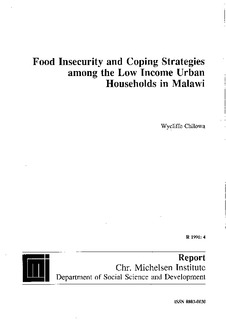Food Insecurity and Coping Strategies among the Low Income Urban Households in Malawi
Research report
Permanent lenke
http://hdl.handle.net/11250/2436013Utgivelsesdato
1991Metadata
Vis full innførselSamlinger
- Bora-import [434]
Sammendrag
This paper highlights the main findings of a survey carried out amongst low income groups in Lilongwe and Blantyre, Malawi's two major cities. The survey covered employment and incomes, expenditure patterns, food and nutritional status, as well as other social and economic aspects of the households. It is found that for many households expenditures exceed regular incomes, and therefore supplementary coping strategies are necessary. The incidence of food insecurity is high, and more than 40 per cent of children under five have some signs of a nutrition problem. Policy recommendations include macroeconomic measures as well as programmes for increased employment and encouragement of the small-scale informal sector.
Utgiver
Chr. Michelsen Institute. Department of Social Science And DevelopmentSerie
ReportR 1991: 4
